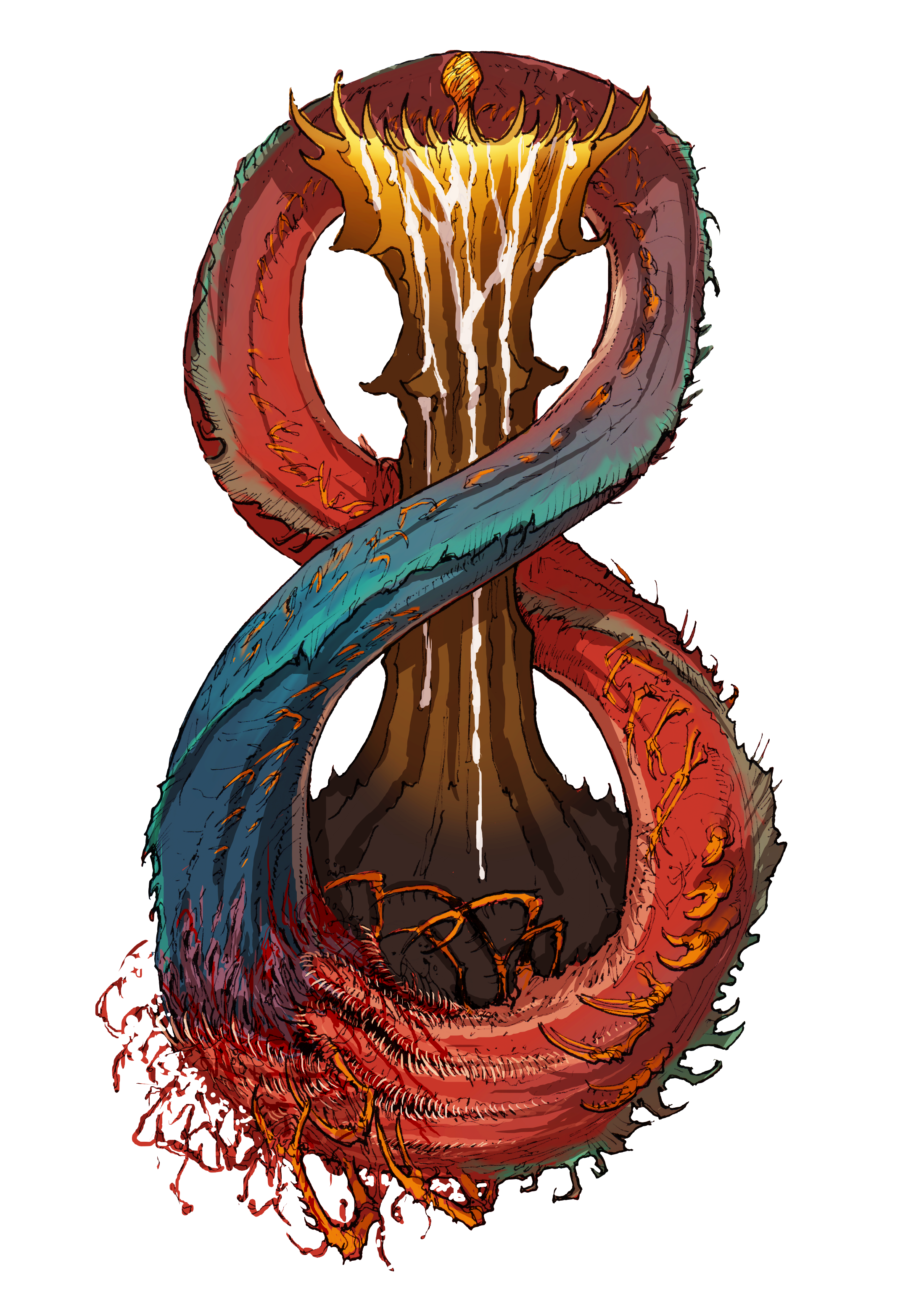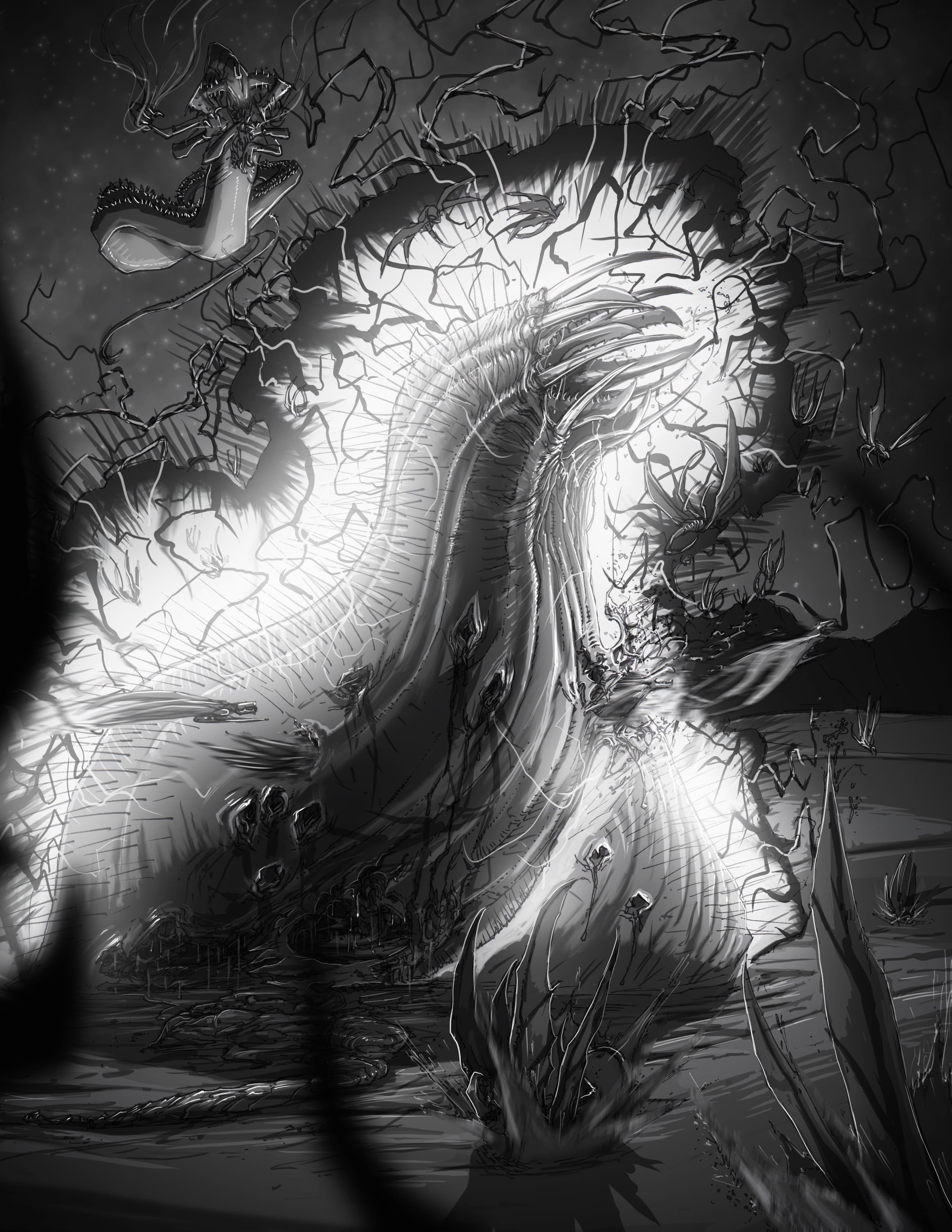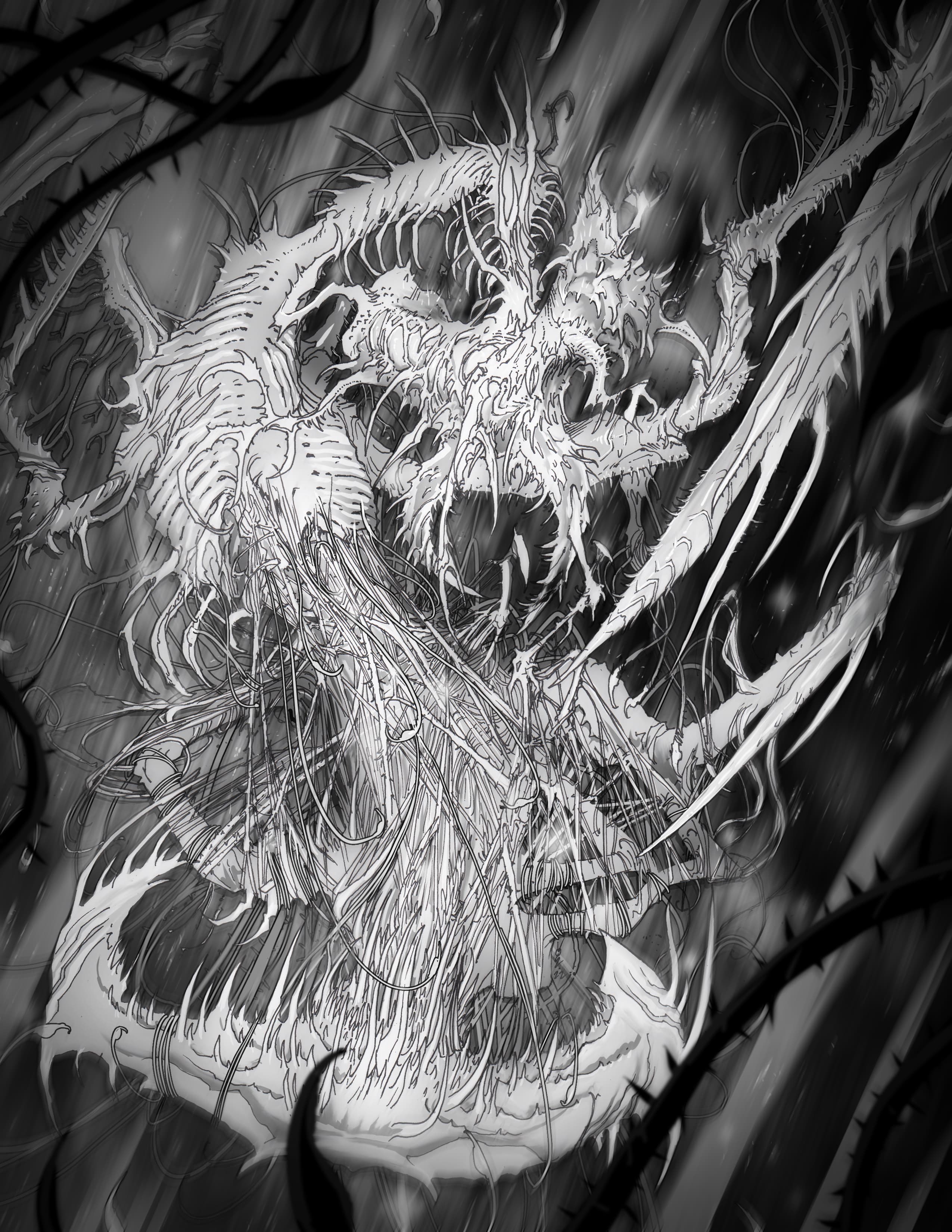

The war has started again, and I cannot ignore the screams. I suffer from a great longing and wish to join the beasts on the dunes of Kath’le Kal. Such thoughts are foolish, I know. There is no returning once you cross the event horizon, but I can’t help but feel that is where I belong. This battle in particular sings to me. I hear the booming thunder of an artificial tempest as brothers clash beneath the bleeding corpse of a mountain. There is death all around me, so why am I not afraid? I am no gladiator, but my father’s sword has never been steadier in my hands. Perhaps there is a warrior in me, after all.
Xerxes spread his wings and leapt down from the Overworld, a rush of wind passing through the hollow tubes in his ear and screeching violently. The hive responded to his movements and sounds, vomiting winged maggots.
The eldriatus, his harpies, glistened wet with mucous, but their wings dried silver, and the stiff hairs upon the antennae hummed from rapid vibrations. Each beating membrane clenched tooth and snapped claw sounded the alarm of a coming plague. Over ten thousand strong, Xerxes army came down from the soft palate, blotting out the pale blue light of the tonsil.
Harpies gathered like a billowing wall of clouds, and flashes of lightning leapt from their beaks, gathering in the coarse hair of thousands of antennae. The sands upon Kath’le Kal shifted as the winds howled and cracks of white energy zipped from one corner to the next.
Engineers were caught on the sands, locked in battle with one another, their armies frayed and beaten, milky white eyes looking up to the heavens. Xerxes could see how weak their control was. The junior engineers spread luminescent thread so thin it frayed at the edges and could be seen straight through. No wonder their creations frothed at the mouth and nipped at their master’s heel.
Impudent dogs bucked under the heat, and their tattered leashes broke. There was no controlling them now as they turned on their own kind. The sands were stained with ichor as they cut throats, broke spines, and shattered skulls. One engineer fled from the field as her eldriatus punctured the soft skin beneath her throat.
“Is this the best you can do?!” Xerxes shouted from above.
He hadn’t even lifted a finger, and his enemies were abandoning the field. They trembled under that black net of electrical energy. A magnetic pulse. The white static that arced between a thousand antennae was for so much more than show.
That charge in the air, that zing at the tip of his tongue, that snapping between his pronged nose made an engineer’s spirit sweat; luminescent threads so slick weaker names couldn’t tie knots. He saw their tiny trembling filaments trying to loop through the pores of their souls and back to their creations, but the bindings slipped free, and their hoard went mad.
Screams echoed throughout the valley as chaos unfolded before him. There was little reason to dirty his claws, little reason to stick a pronged fork in the eye of his enemy, but pride demanded action.
Xerxes was the hollow spear, the heir apparent, the lord of the weeping valley, and the one who defeated Icarus in his prime. The broken wings stitched upon his forehead and sprouting from each incarnation were proof of his might.
How could he earn such things from the safety of the back ranks?
Xerxes would be the first to dive, the first to whistle the battle cry and sink his teeth into the flesh of his enemy. Yet, before that, there were formalities to be honored. After all, Xerxes was known by another name.
The storm caller.
Boom!
A blinding flash struck the ground, sending ripples through the valley with limbs and black ichor showering down for miles.
Xerxes tightened his grip; ten thousand luminescent threads looped between his knuckles and through the pores in his soul. They were indeed slippery, but he knew how to hold them, how to manipulate them; Twisting his elbow around and rubbing his distal and proximal digits together, the scaphoid bone poked through his wrist, vibrating that bushel of thin filaments. The harpies reacted, bending their antennae and shifting the hairs in unison.
Boom!
Another shaft of crackling energy struck, turning sand into glass, which shattered beneath the weight of a fallen engineer, dead before he hit the ground.
Boom!
The third pierced the heart of the mindless hoard, filling craters with screeching horrors, blackened ribs, and boiling tar.
Three strikes, that’s all the patience Xerxes could muster. Matching the cries of horror around him, he bellowed a challenge, diving onto the battlefield. The harpies followed suit, collapsing into the sands like a black wave washing over the shores.
Xerxes delivered the first blow, wedging serrated claws into the enemy’s collarbone and rending them in two. The black wave struck next, blanketing the surface and muffling panicked screams. Beating their wings in unison, the temperature beneath the tempest rose.
The skin below Xerxes’s pronged nose sweat as he pushed himself back into the air, escaping the smell; burnt hair, overcooked tendons, and curdling ichor. Even some of his harpies succumbed to the heat, but they were weak and had no place in his hive.
“Is this all you have?!” he shouted once more.
A few engineers escaped the initial wave and snuck back down into their hives, but it was too late. The harpies had already found their way in and latched onto their vessels a hundred strong, dragging them out by the heel. The tiny gnats climbed down their throats, drowning them in a sea of silver wings and humming antennae.
“What right do any of you have to call me brother?” Xerxes asked, pulling the shimmering strings tight and driving his harpies back into the air.
Just as expected, hardly a challenge; their armies were so small and creations too soft and improperly developed to be considered anything more than a warm-up. Xerxes hadn’t left his nest to play games with these children. No, he came for another.
The scent was still there. Sorting through the putrid odor of boiling intestines, rotting livers, and baked kidneys, Xerxes could smell something else. Sweet, savory, and sour. This was the scent of an ancient one, a primordial engineer who had tasted the Pallid Throne.
“Icarus!” his voice echoed throughout the blackened sands as harpies scoured the hills for any signs of life.
There was something that moved in the distance just now. A shifting of stones upon a jagged mountain. A mountain with a strange milky brown color decorated with thousands of towering spines.
Suddenly, Xerxes heard a roar that shook the ground, dunes crumbling away and swept up into massive dust cyclones. The blackened dirt choked the skies, and he shielded his eyes from the cutting wind.
That was no mountain. Icarus was here.
Xerxes cracked the luminescent threads between his knuckles, driving the harpies further up into the air above the raging sandstorm. Too late, the first wing took the brunt of the force torn away in raging winds and buried beneath the plains of Kath’le Kal. The rest of his hive broke above the storm, but the currents up there were violent, stirred up as that massive creature filled its lungs for another scream.
Xerxes forced the harpies together, with a few of their wings breaking apart in the winds. They had to push back; they had to reorganize quickly. His knuckles bled, bones piercing through the soft flesh as he cracked the whip once more.
From up there, he could see the whole of Icarus’s juggernaut, that moving mountain. It had a spine as rigid as stone, bearing an endless forest of sharply pointed hairs, truncated beaks, cavernous maw, and a serpentine body miles long. It was slow, so slow the sands built up around it as the creature lumbered on in agony, so characteristic of the old rat’s designs.

Xerxes pushed his wings hard against the tempest as his black plague gathered, forming an immense wall cloud that crackled with energy.
Boom!
An electrical surge struck the side of the living mountain, breaking open its hide and scattering ichor across the plains. The creature reared up, unleashing the fury of its lungs, a cyclone roaring past his ears and tearing into Xerxes’s hoard. Any single harpy would have been blown away, but together, they withstood the storm.
Boom!
Another blast through the creature’s chest, piercing its heart as chunks of flesh rained down. The juggernaut screamed once more, the hairs along its back standing up and humming. It pushed on, rivers of ichor pouring out of its wounded chest; more than one heart still beating beneath its breast.
Boom!
The electrical blast gathered along its spine, flashing like steel as it zipped from the tips of one hair to the next. The charge in the air was palpable now and stung the edges of his forked tongue. In that fleeting moment, Xerxes saw the size and volume of Icarus’s spirit. A vast interconnecting web that looped through more than a thousand nodes across the living mountain. There was no shaking this engineers grip; Icarus’s will was iron.
Then, Xerxes felt the luminescent threads between his knuckles loosen, and he realized too late what was about to happen.
Icarus’s juggernaut lifted itself into the air, standing on its tail like a viper and raising the crackling forest upon its rigid spine into the black clouds above.
Boom!
It unleashed the built-up energy in a sonic wave that snapped Xerxes’s legions in two and blew the caps of distant mountains clean off.
For the first time in decades, more than a thousand thin filaments slipped free from his grasp, and a portion of his army went mad. In the skies still violent with deadly currents, his harpies turned on one another, ripping themselves apart, skin and bone plummeting from the skies.
Icarus’s juggernaut dropped back onto the ground, pushing dirt and sand into the air and howling as the hairs on its back still hummed, ready to discharge again. One more breath and it would rise, breaking apart the rest of Xerxes’s army.
He couldn’t allow that.
Cracking the bundle of thread still between his knuckles, Xerxes ordered the rest of his harpies down to the ground. The black wave spilled forth, dropping on top of the living mountain. He wanted to cook it alive, but his creations couldn’t get close, simply impaling themselves in a forest of needles. Still, their bodies soaked up the energy and spread it harmlessly into the void.
There was still a chance to win this; Xerxes scanned the grounds for his target, not the massive howling dune beast, but its master. There, in the darkness just under the mountain’s teeth, was the flash of light beneath cracks of thunder; many silver eyes rolling in the dark. He dropped himself close to the ground and barreled just under the mammoth’s chin as the few remaining harpies tore into its thick, calcified hide.
“Hello, brother.”
Icarus was waiting for him, pouncing from the dark as Xerxes swooped in with open talons. His rival’s claw tore a chunk out of his right side, but not before he ripped out one of Icarus’s left eyes. Xerxes never even felt pain, his heart pumping so fast, howling in challenge as he crushed the eye between his fingers.
Xerxes felt a tug at his spirit, and he noticed a few of his enemies’ tendrils looping through the pores in his soul.
The attack was a ruse.
With a forceful push, he was ripped free from his vibriatus pink tendrils, whipping wildly from the back of his skull as a blinding white light spilled out onto the plains. Icarus, too, had left his vessel, a porous spirit wrapping wildly around him like a spider.
Together they tumbled through the upper layers of the Overworld, through the mucous membrane, past the endothelial layer of their mother’s blood vessels, and back into the dark world.
Plummeting through the abyss, they tore into each other’s souls. Icarus pulled tight, the edges of his spirit tearing open and stretching into long filaments. They became knives, hooked feet, serrated teeth, and jabbing proboscis. Every form that Icarus had ever adopted crashed in and out of existence, like creatures struggling to keep their heads above water.
Xerxes, too, fought back, rolling his spirit into thin needles and stretching the edges into fangs, claws, and pronged horns that skewered, cut, pinched, and split his enemies’ phosphorescent hide. They screamed in agony, white-hot pain shooting along the roots of their souls.
In a moment of panic, Xerxes felt another’s spirit crying out, a lesser soul barely noticeable above the ocean of Icarus’s spirit, hopelessly ensnared.
As a bladed hand-cut through his fading light, Xerxes tumbled further into the dark realm where the intoxicating warmth of their mother’s embrace grew stronger and stronger.
He had to get out before it was too late.
Drip, drip.
He had to get out before he lost himself.
Drip, drip, drip.
Xerxes kicked hard against Icarus, his devious light splitting into pieces and sticking to his spirit, dragging him back into a bladed embrace. He screamed, rolling himself into a single-pointed spear and forcing himself straight through the center of that old cobweb. The corners twisted, stretched, groaned in protest but finally gave, the old rodent’s grip loosening.
The hollow spear shot through the void and back into the Overworld, where his vibriatus was locked in feral combat, rolling in the dust. Xerxes sunk back into the skull, pink tendrils embracing him tightly as the plates closed once more.
Back in control, he spit out a chunk of flesh and hurled the rat king’s body off him before Icarus could regain control. With only two good wings remaining, he pushed himself back into the air, summoning what few harpies he had left.
Xerxes spit blood, clenching his fists so hard his knuckles turned white. He had thought to catch Icarus by surprise. He thought wrong. The old rat was prepared for him and had shaped his creation days in advance.
Finally, after several weeks of dry weather, the skies opened, and crimson rain showered down from their mother’s epithelial lining. The monsoon stained his cheeks red, his heart beating like a drum.
Icarus knew the rains would come today; the rat had finally adapted, and Xerxes nearly fell for his trap. He couldn’t help but laugh, the vibrations sending ripples of pain through his punctured lungs.
Winning this war would not be easy.
That was why the nectar tasted so sweet.
That was why every engineer thrummed with pride when the crown dug into their skull.
“That is why,” Xerxes said under haggard breath. “I love you, brother.”

Icarus slipped back into the skull of his vibriatus too late. Xerxes had already abandoned the field, his harpies fleeing to the soft palate above.
“Curse you!” Icarus struck the blackened sand, a wave of pain coursing through his left hand.
If only he had held on for a few minutes more, he could have removed Xerxes from the war.
“That was close.” Velbrava said, looking at the crushed remains of one of Icarus’s eyes.
Above Icarus came the labored breath of his dying creation. Seven of its eight hearts lie crushed, with a river of blood running free upon the sands. It would never leave this spot becoming a proper mountain in time.
“That is why you always shape extra organs.” Icarus said, wincing as he pulled a chipped bone from his thigh.
The junior engineer was full of questions.
“Why do you shape the liver like that?”
To leave more room for gills and a cyanide bladder.
“Why do you carve a thousand holes in the spine?”
To plant a thousand blades bristling with fur to hold a charge.
“Why do you leave the stomach intact?”
Now that was a secret he would not share.
Icarus stepped out from under the shade of his mountain’s chin, surveying the carnage. More than a hundred miles of burnt bodies, broken legs, and splintered bones. He laughed as the first of the crimson rain touched the ground.
“Why are you so happy?” Velbrava asked.
“Because the war has only just begun.”